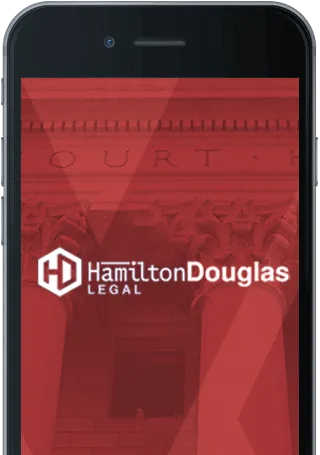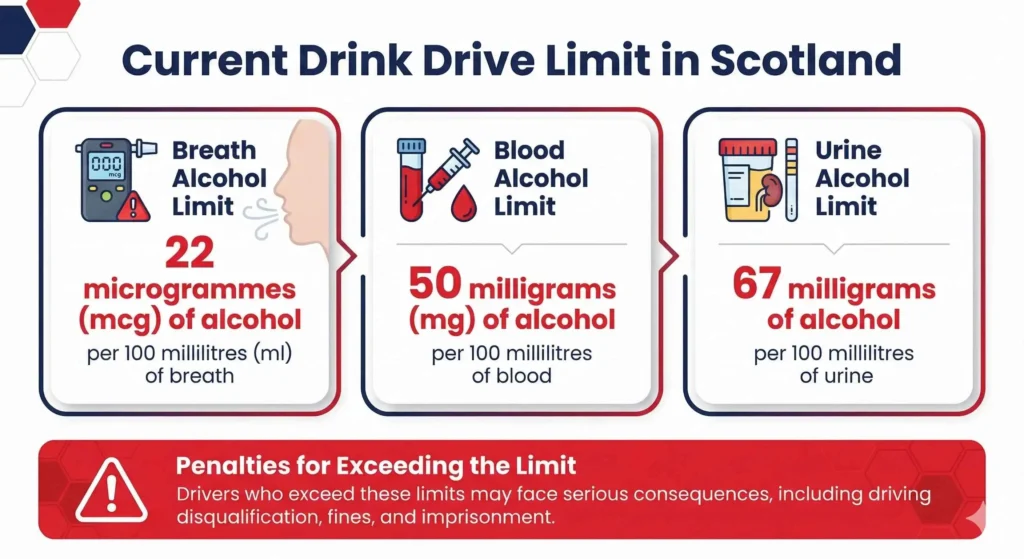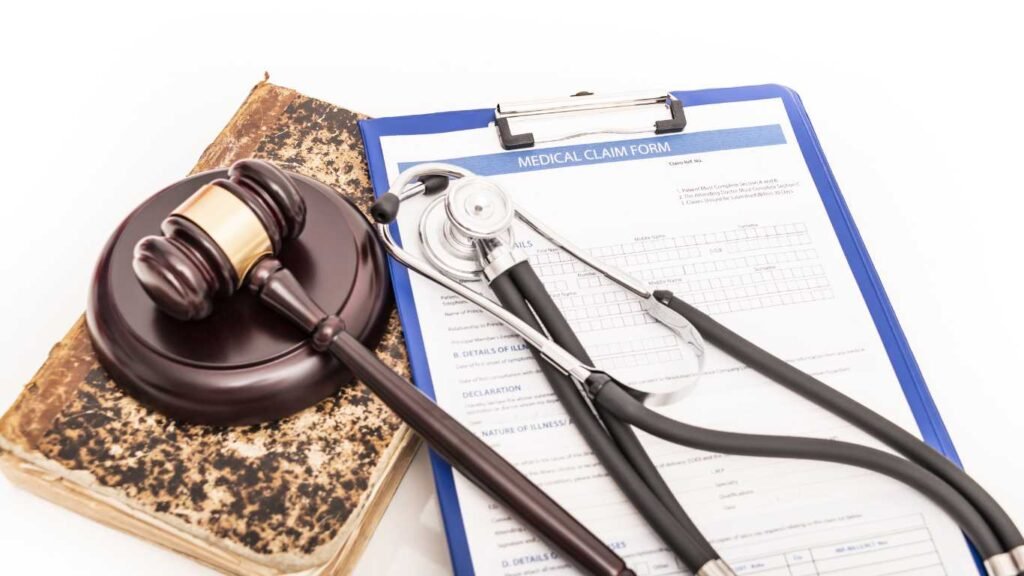What Is the Drink-Drive Limit in Scotland?

Legal Writer
Current Drink Drive Limit In Scotland:
The maximum legal limit for driving in Scotland is 22 micrograms (mcg) of alcohol per 100 millilitres (ml) of breath or 50mg/100ml of blood.
The Breath Limit:
22 microgrammes (mcg) of alcohol per 100 millilitres (ml) of breath
The Blood Limit:
50 milligrams (mg) of alcohol per 100 millilitres of blood
The Urine Limit:
67 milligrams of alcohol per 100 millilitres in urine.
Drivers who exceed these limits can face serious repercussions, including disqualification from driving, fines, and even imprisonment.
In addition, anyone injured due to an accident caused by someone over this legal limit may have grounds to make personal injury claims scotland against responsible parties.
Table of Contents

Get In Touch With Your Local Office:
With local knowledge and a national network of experts, we have the experience you can count on.
How Much Can You Drink When Driving?
In Scotland, the rules regarding alcohol and driving are clear and very strict. According to the legislation, the legal limit for alcohol Scotland is 50 milligrams of alcohol in every 100 millilitres of blood, 22 microgrammes (mcg) of alcohol in 100 ml of breath, or 67 milligrams (mg) in 100 ml of urine. To put it in context, this is lower than the rest of the United Kingdom.
Nonetheless, even these specific numbers might not clearly show how much you can drink before driving. Numerous factors can affect how much alcohol you can consume before reaching the Limit, such as your weight, age, sex, and how quickly your body metabolises alcohol. You can get an estimate using a Scottish drink drive limit calculator.
Remember, these figures are upper limits, not targets, as even small amounts of alcohol can impair your ability to drive. Therefore, the best and most professional advice we can offer is straightforward: If you plan to drive, don’t drink; If you drink, don’t drive. It’s always better to arrange for a designated driver, use a taxi, or utilise public transportation.
For the sake of your safety, the safety of your passengers, and the safety of others on the road, the message is clear: Zero alcohol is the only sure way to avoid the risk of drunk driving. It’s also the only certain way to avoid potentially severe legal consequences.
What Happens If You're Convicted Of Drink-Driving?
If authorities convict you of drunk driving in Scotland, you will face serious penalties, reflecting the grave danger such behaviour poses to yourself and others on the road.
Firstly, you will receive a criminal record, which can affect numerous aspects of your life, including your employment prospects and your ability to travel to certain countries.
In terms of direct legal consequences, you will face an immediate driving ban. The length of this ban can vary; however, it will typically be for at least 12 months. The minimum ban extends to three years if you commit the offence more than once within ten years.
A hefty fine also applies, potentially reaching up to £5,000. In extreme cases, you may even face imprisonment; this can be up to six months for a standard offence. However, the sentence can extend to 14 years for causing death by negligent driving when under the influence of alcohol.
On top of these legal penalties, you will also face practical implications. Your car insurance costs are likely to increase significantly, and some insurers may refuse to cover you at all. Furthermore, after your ban, you may need to pass the extended driving test, a more rigorous version of the standard driving test, before you can get back on the road. The court decides this requirement on a case-by-case basis.
Lastly, the social stigma associated with drunk driving can have a profound impact. The damage to your reputation in your local community can be extensive and long-lasting. Given these serious potential consequences, the message remains clear: don’t drink and drive. If you are injured or affected by a drink-driving accident, consulting personal injury solicitors Scotland may help you understand your rights and pursue appropriate compensation.
What Are The Consequences Of Refusing A Breath Test Scotland?
When stopped by police and asked to take a breath test, refusing can have serious legal repercussions. Refusing can be considered an offence and lead to immediate arrest regardless of your actual intoxication level. Depending on where they found you, police might require blood or urine samples from you so they can determine if you exceed the legal alcohol driving limit Scotland.
Refusing without providing an acceptable explanation, such as medical reasons, can have severe repercussions – fines, license suspension, and jail time. Therefore, it is crucial that individuals recognise that refusing a breath test without providing valid reasons will be treated seriously by authorities; cooperation with police is always advised.
What Are Scotland's Drink-Drive Limits For Beer And Wine Ahead Of The Christmas Party Season
As the Christmas party season approaches, knowing Scotland’s drink-drive limits for beer and wine is important.
In Scotland, the amount of alcohol one can drink before driving depends on age, weight, and the type of alcohol consumed. It is illegal to drive with 22 micrograms of alcohol per 100 millilitres of breath or 50mg per 100ml in blood (it’s the drink drive limit).
Although there is no specific figure for how much one can safely consume when out drinking, Scottish government guidelines advise against driving after consuming alcohol, including beer and wine, at all.
The Law Around The Drink Drive Limit In The Rest Of The UK
In England and Wales, it is illegal to drive a car if your blood alcohol level (BAC) is above 0.08% (or 80mg per 100ml of blood). This means drivers should not consume alcohol before getting behind the wheel.
Even if a person’s driving seems normal, police officers can still request a breathalyser test if they reasonably suspect the person is under alcohol or drugs. A conviction for drunk driving can result in jail time of up to six months, a fine of up to £5,000, and a driving ban of at least 12 months, which may be extended under certain conditions.
What Was the Drink Drive Limit in Scotland in 2024 & 2025?
In Scotland, the legal drink-driving limit in 2024 is 50 milligrams of alcohol per 100 millilitres of blood. This has been the case since 2014, when it was reduced from 80mg/100ml to a lower, stricter number.
Despite calls from some organisations for the status quo to be reversed and for an increase in levels allowed before prosecution, there will be no change in legislation for some time yet.
Drivers should continue to consider their own individual tolerance levels when considering how much they can drink before getting behind the wheel. It remains illegal across Scotland and other parts of the UK to operate a vehicle under the influence of alcohol or drugs, regardless of how much you have consumed beforehand.
Legal Drink-Drive Limit in Scotland in 2023
The following will explain the drink driving limit Scotland. According to the law, anyone caught operating a motor vehicle with more than 50 milligrams (mg) of alcohol per 100 millilitres (ml) of blood in their system will face prosecution and potential imprisonment, dropping from the current 80mg limit.
This puts Scotland in line with countries such as Ireland, Spain, and France, where similar laws are already enforced.
It is thought that this measure will assist in reducing the number of alcohol-related accidents on Scottish roads (Scotland accident), which now account for approximately 17% of all road fatalities annually.
Drink Drive Limit in Scotland in 2021:
What is the Scotland Drink Drive Limit? The Drink Drive Limit Scotland 2021 is an important measure for road safety. The legal limit was lowered from 80 milligrams of alcohol in 100 millilitres of blood to 50 milligrams. This aligns Scotland with much of the rest of Europe, reinforcing the message that drunk driving should not be taken lightly.
Is Scotland Zero Tolerance On Drink Driving?
Yes! Drunk driving is a serious offence that can have severe consequences for those involved and their families. In recent years, alcohol has been a factor in a significant number of serious and fatal crashes. As well as risking a prison sentence and hefty fines, drivers who are over the Limit also face losing their licence or having it suspended for up to three years if caught by police.
Drink Drive Limit in Scotland in 2019:
The following will explain the drunk driving laws in Scotland in 2019 and how new restrictions on drunk driving were implemented in Scotland. The permissible BAC (blood alcohol concentration) levels for drivers are now 22 micrograms per 100 millilitres of breath, 50 milligrams per 100 millilitres of blood, and 67 milligrams per 100 millilitres of urine.
If the authorities pull you over, you must follow these rules or face legal consequences. Offenders risk losing their driver’s licence for a year and paying fines of up to £5,000. Courts may offer a rehabilitation course that can reduce a ban if completed. All drivers in Scotland should be familiar with and abide by the country’s strict zero-tolerance policy against driving under the influence of alcohol.
Drink Drive Limit in Scotland in 2018
What is the Scotland Drink Driving Laws Scotland? The drink-driving limit in Scotland has been reduced from 80mg to 50mg per 100 ml. When assessing a safe alcohol level before driving, drivers need more room for mistakes.
New restrictions were enacted in December 2014 to reduce drunk-driving accidents. Infringing on the legislation can result in a 12-month driving ban, a £5000 fine, and possibly prison time. Scottish drivers should be aware of these changes and be cautious if they consume alcohol before driving.
DEDICATED CLAIMS ADVISORS
Our dedicated claims advisors are always available to offer free legal advice.
100% NO WIN NO FEE CLAIMS
All our claims are processed on a No Win No Fee basis; you pay nothing if you lose.

MILLIONS SECURED IN DAMAGES
To date, we have secured millions in damages.
THOUSANDS OF SATISFIED CLIENTS
To date, we have helped thousands of clients recover compensation and continue to do so.
Why Is The Drink Drive Limit Not Zero?
The alcohol limit for driving in Scotland is lower than in the rest of the United Kingdom. In Scotland, it is illegal to drive a vehicle after consuming more than 50 milligrams of alcohol per 100 millilitres of blood. While this is significantly lower than the 80 milligrams permitted in other parts of the UK, many have asked why such a limit still exists.
From an enforcement standpoint, it would be impractical and costly to enforce a zero-tolerance policy on drinking and driving in Scotland. With no legal distinction between those who consume only small amounts of alcohol before getting behind the wheel and those who become dangerously intoxicated, police could not accurately judge when someone had too much to drink or not enough.
Furthermore, attempting to enforce such a policy would require an increased level of policing resources, which may only be feasible for some local authorities across Scotland.
How Much You Can Drink When Driving In Scotland?
Knowing how much you can drink and still be safe to drive is key to staying within the law.
The maximum legal limit for driving in Scotland is 22 micrograms (mcg) of alcohol per 100 millilitres (ml) of breath or 50mg/100ml of blood.
Many factors affect how quickly your body processes alcohol, such as weight, gender, and metabolism, so it’s impossible to figure out how much you should drink before getting behind the wheel.
The best advice is not to drink any alcohol if you intend to drive, even if it’s just a short journey. This is because drunk driving penalties in Scotland are hefty, so refrain from drinking and driving.
How Many Units Can You Drink And Drive In Scotland?
In Scotland, the laws surrounding drunk driving are among the strictest in the UK. Legal Drink Drive Limit Scotland is lower than most other nations – it stands at 50 milligrams of alcohol per 100 millilitres of blood (50mg/100ml). Any driver caught over this Limit will be charged with a criminal offence and face serious consequences.
It can be difficult to gauge how many units you have consumed and calculate whether or not it puts you over the legal limit. Generally, a pint of average-strength beer contains around two units, as does a single measure of spirits or a small glass (125ml) of wine.
However, strength levels vary greatly between drinks, so it’s important to know your drink’s strength before consuming and assessing if you can drive afterwards.
What’s The Punishment If I’m Caught Drink Drive In Scotland?
Drink driving is a major problem across Scotland, with many people risking their lives and the lives of others by getting behind the wheel when they’re unfit to do so. Scottish law provides strict punishments for those caught drunk driving to discourage this dangerous behaviour.
In Scotland, the punishment for being caught drunk driving is determined by how much alcohol was in your system and whether you have any previous convictions. The minimum penalty includes a fine and an automatic 12-month disqualification from driving – even if it’s your first offence.
Depending on the amount of alcohol in your system, you may receive up to 6 months of imprisonment. If it’s proven that you were significantly over the Limit or had excessively dangerous control of your vehicle, then harsher punishment can be expected.
What Are The Consequences Of Drunk Driving?
In Scotland, drunk driving is a serious offence with serious repercussions. If convicted of a drink-driving offence, a person might expect serious penalties from the courts and local licensing bodies.
In Scotland, even the most minor DUI conviction can result in a 12-month driving ban, with more serious offences resulting in lengthier periods of disqualification or possibly jail. In addition, any violating driver may face a fine of up to £5000.
Drivers may also be required to participate in a rehabilitation program, which would entail attending classes at their own expense.
Anyone convicted of the most serious degree of drunk driving crime faces an unlimited fine and up to 6 months in prison; this includes young drivers under the age of 20 who do not have a full license entitlement.
If convicted, it’s important to understand your rights and explore legal options. Experienced No Win No Fee Solicitors Scotland can assist in navigating the legal system, whether you are challenging the conviction or seeking compensation.

Can’t Work Due To Illness Or Injury?
Use our free online claim check tool and find out in minutes if you have a claim.
Penalty For Drink Driving
Drink driving in Scotland is an offence with serious legal consequences, with both immediate and long-term penalties attached to any conviction. A conviction will leave a criminal record, which could prevent future job offers, travel arrangements, or more – it will affect your life for years to come.
Your prison sentence could reach as long as six months behind bars. Furthermore, you will likely face a driving ban of at least one year; however, if this offence occurs twice within 10 years, it could extend further and last three years.
There could also be substantial fines – potentially unlimited, depending on your case. If an accident that results from driving under the influence leads to death, penalties become even harsher. Since June 28, 2022, those charged with death by negligent driving while under the influence can even face life imprisonment penalties; clearly, drunk driving is simply not worth the risk!
Anyone who gets behind the wheel after consuming alcohol should know they are putting themselves, other road users, and pedestrians at risk. Driving under the influence of alcohol impairs a person’s ability to think clearly and make decisions, which can result in dangerous situations on the roads.
How Can You Avoid Drunk Driving On Nights Out?
If you wish to have a night out, there are a few easy steps you can follow to guarantee you arrive home safely. First, consider selecting a designated driver—someone who will drive you home and stay sober for the evening. If you are with others, you may even offer to be the assigned driver yourself.
Planning ahead is also an excellent option – book a cab or rideshare before leaving so you won’t be rushing later in the evening to find transport. If public transport is accessible in the neighbourhood (where you would end up at night), it might be a quick and reasonably priced approach to going home free from driving stress. These steps will help you enjoy your evening free from the concern of driving under the influence.
Causing Death:
Drink driving is a serious offence that has caused numerous deaths. It occurs when drivers have consumed alcohol before operating a car, boat, or other motorised vehicles.
Alcohol impairs judgment and slows reaction times, making it dangerous to get behind the wheel after drinking. Additionally, drivers with higher blood alcohol levels are more likely to speed and drive aggressively, which increases their risk of causing accidents.
According to the latest statistics published by the UK government, there were 220 deaths in Great Britain due to drunk driving in 2019. This represents a slight increase from the 2018 figure of 200 deaths.
In addition to the fatalities, there were 5,860 casualties of all severity in drunk driving accidents in 2019, a decrease from 6,040 casualties in 2018.
It is important to note that these figures only include accidents where at least one driver or rider was over the legal alcohol limit Scotland. There may be other accidents where alcohol was a contributing factor but not the main cause, which are not included in these statistics.
Criminal Record:
Drinking and driving has become a major cause of traffic accidents and deaths in recent years. Such recklessness might quickly lead to criminal records and dangerous roadways.
The legislation governing drunk driving offences in Scotland is the Road Traffic Act 1988, as amended by the Road Traffic Act 1991 and the Road Traffic Act 1998.
The penalties for a drunk driving conviction in Scotland can vary depending on the circumstances of the offence, but they typically include the following:
- A minimum 12-month driving ban
- A fine of up to £5,000
- Up to six months in prison
- A criminal record can have implications for employment and other areas of life
In addition to the above penalties, a person convicted of a drunk driving offence may also be required to attend a driver rehabilitation course and may have their vehicle seized and impounded.
The specific penalty a person receives for a drunk driving offence in Scotland will depend on factors such as their level of intoxication, their previous driving record, and whether anyone was injured or killed as a result of the offence.
FAQs
How many units to drive Scotland?
The Scotland alcohol driving limit is 50mg of alcohol per 100ml of blood or 22mcg per 100ml of breath. There is no safe number of units because drink strength, body size, food, and timing all change your blood alcohol level. The safest choice is not to drink at all if you plan to drive.
How does Scotland drink drive limit vs England compare, and why is Scotland’s limit lower?
Scotland sets the limit at 50mg per 100ml of blood, while England and Wales keep 80mg. Scotland lowered it in 2014 to reduce crashes and to match many European countries. The stricter limit aims to reduce deaths and serious injuries on the roads.
Can I use a drink drive calculator Scotland to estimate if I’m under the legal limit before driving?
You can use online tools to get an idea, but they are never exact. Everyone processes alcohol differently, so results can be wrong. The Scotland zero tolerance alcohol approach means the safest option is not to drink if you plan to drive.
What are the recommended Scotland drink drive limit units for different types of alcohol, like beer or wine?
There is no set number of safe drinks because strength, size, and timing change how alcohol affects you. A pint of beer or a small glass of wine might already take you over the Scottish alcohol driving limit. The best advice is to avoid alcohol altogether if you need to drive.
Easy Ways To Get In Touch
We are here to help. Give us a call, request a call back or use our free claim check tool to get in touch with our friendly legal team. With local knowledge and a national network of experts, we have the experience you can count on.






